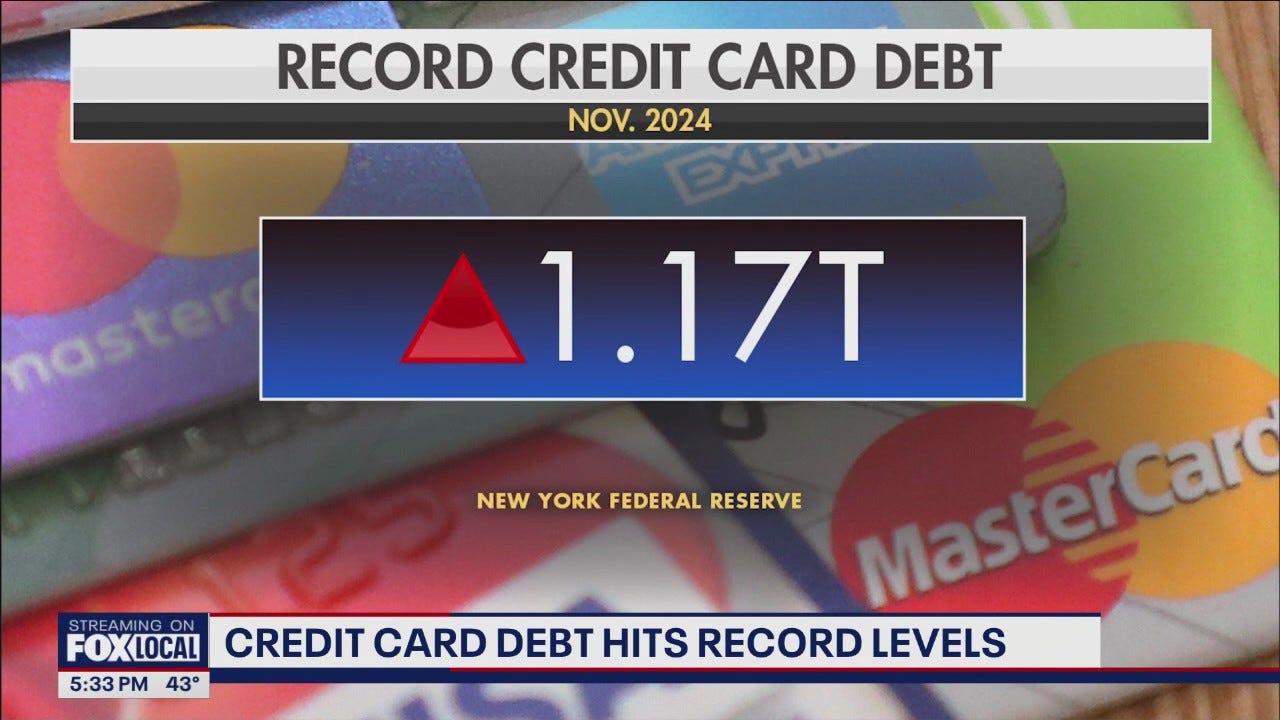
Credit card debt hits record levels
Americans are carrying a record amount of credit card debt, and interest rates are almost near record highs.
Fox – Seattle
Personal finance can be daunting. Few consumers relish the thought of reading a credit report, shopping for car insurance or parsing a bank statement.
But what if we told you that some of the smartest “financial fixes” take an hour or less?
That’s the spirit of a report from AARP titled, “9 Smart Financial Fixes You Can Tackle in an Hour.” It appears in the October/November issue of AARP The Magazine.
We’ve adapted their report into one of our own, covering some favorite AARP tips and a few others.
Here, then, are 8 financial fixes for anyone with an hour to spare.
Read your credit report
Credit reports are inherently scary. But it’s a good idea to check yours regularly, said Ted Rossman, a senior industry analyst at Bankrate.
One 2024 analysis found that nearly half of credit reports may contain errors. Those mistakes can hurt your credit score.
It’s fairly easy nowadays to read a credit report. The big credit agencies give you free access on the site AnnualCreditReport.com.
As you read your report, Rossman said, look for accounts that don’t belong to you, wrong names and addresses and anything else you don’t recognize. Report errors to the credit bureaus, or to the company that holds the account.
Freeze your credit
Freezing your credit ensures no one else can open an account in your name. It’s a strong defense against identity theft.
“It locks the bad guys out,” Rossman said. “It’s one of the few proactive things we can do to protect our identities.”
A credit freeze is relatively quick, and it’s free. U.S. PIRG offers a step-by-step guide.
Apply for a zero-APR credit card
Vexed by credit card debt? One of the best ways to pay it off, ironically enough, is with another credit card.
A zero-APR credit card is a potent tool for paying down debt. Here’s how it works: You transfer debt onto the card from another loan with an onerous interest rate. Then, you have a promotional period of roughly 12 to 21 months to pay it off. During that time, you pay no interest.
“A zero-interest card, used properly, is a huge tailwind for your debt-payoff efforts,” Rossman said.
You can apply for a zero-APR card in minutes. Be forewarned, though, that consumers with lower credit scores may get turned down.
Open a high-yield savings account
One of the easiest fixes in personal finance is to put your savings to work in a high-yield account.
More than half of savers earn less than 3% in annual interest, Vanguard reported in a recent survey.
Inertia hinders many consumers from seeking out higher rates. But many online banks offer 3.5% to 4% on high-yield savings, according to roundups from NerdWallet and Bankrate.
“I think that an important step there is to shop around the different options and make sure you’re getting the highest APY,” or annual percentage yield, said Sam Taube, a lead investing writer at NerdWallet.
Shop for discounts on auto insurance
Auto insurance rates are projected to rise by 7.5% in 2025, according to MarketWatch Guides.
All the more reason to shop around before renewing your policy, said Daniel Bortz, personal finance editor at AARP.
To speed things up, collect quotes from multiple insurers. You can do that on comparison sites such as Insurify, Policygenius and The Zebra, Bortz said.
As you shop, “make sure you’re comparing apples to apples,” Bortz said. Policies differ on coverage limits and deductibles.
You can also save money by tweaking your policy. You can raise your deductible. You can drop collision coverage on an older car. In an earlier report, we covered those and other hacks for saving on car insurance.
Look for unclaimed assets
Millions of Americans have unclaimed cash in lost or forgotten accounts: old bank accounts, uncashed paychecks and even left-behind 401(k) accounts.
Drop in to Missing Money, a one-stop clearinghouse of unclaimed property, to find old bank accounts and other lost funds.
For forgotten 401(k) money, check out the National Registry of Unclaimed Retirement Benefits.
Audit your subscriptions
Many consumers spend money every month on subscriptions they don’t use. It’s easy to sign up for a streaming service or online news site. It’s just as easy to forget about it.
“The average American has something like 12 media subscriptions,” Bortz said. “Very often, you could be paying for a subscription you’re no longer using.”
A recent CNET survey found that the average American wastes about $200 a year on unused subscriptions.
Take a few minutes and review the last 30 days of activity on your accounts, Rossman said. Look for forgotten subscriptions. Follow the steps to cancel them.
Raise your 401(k) contribution
Saving more for retirement is a way to reward your future self, financial planners say.
Many Americans already do a great job at retirement saving. The 401(k) savings rate recently reached an all-time high.
But most of us aren’t saving as much as we could. The maximum 401(k) contribution is $23,500 in 2025, and there are even higher limits for older savers. It’s fairly simple to increase your contribution by a percentage point or two.
“If you’re saving 10%, can you make it 11?” Rossman said. “The point is, especially if you do it gradually, you probably won’t even miss the money.”
